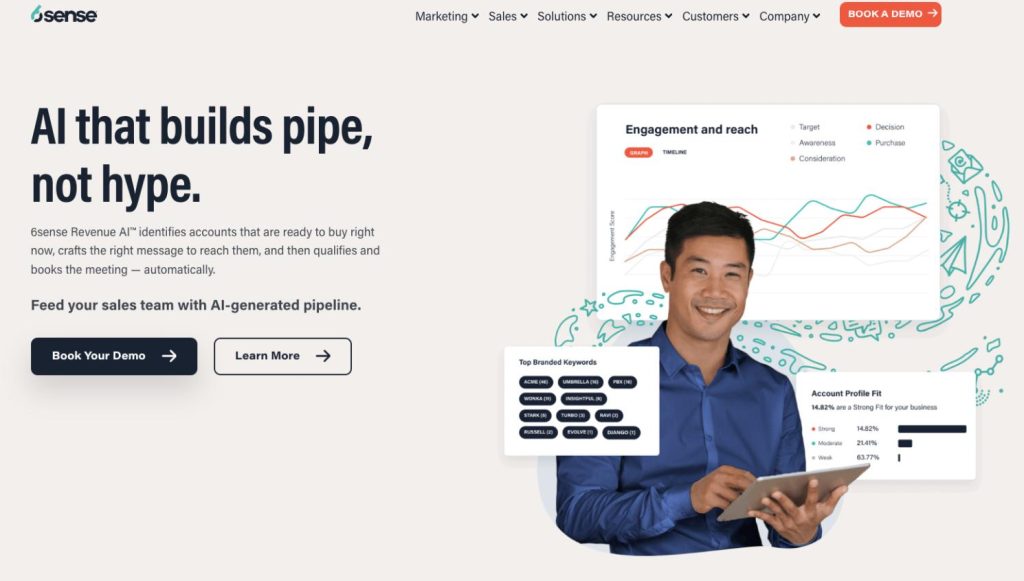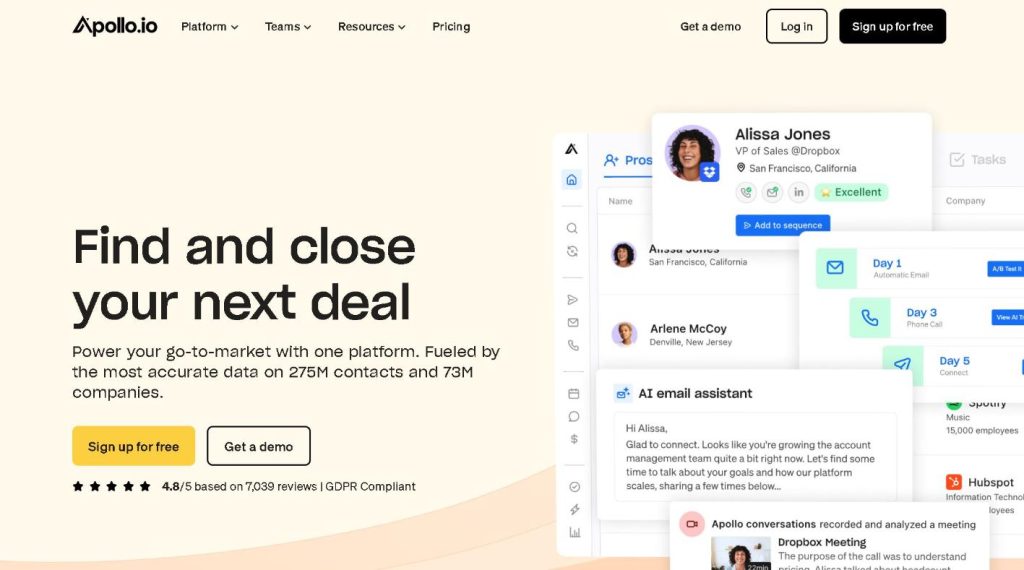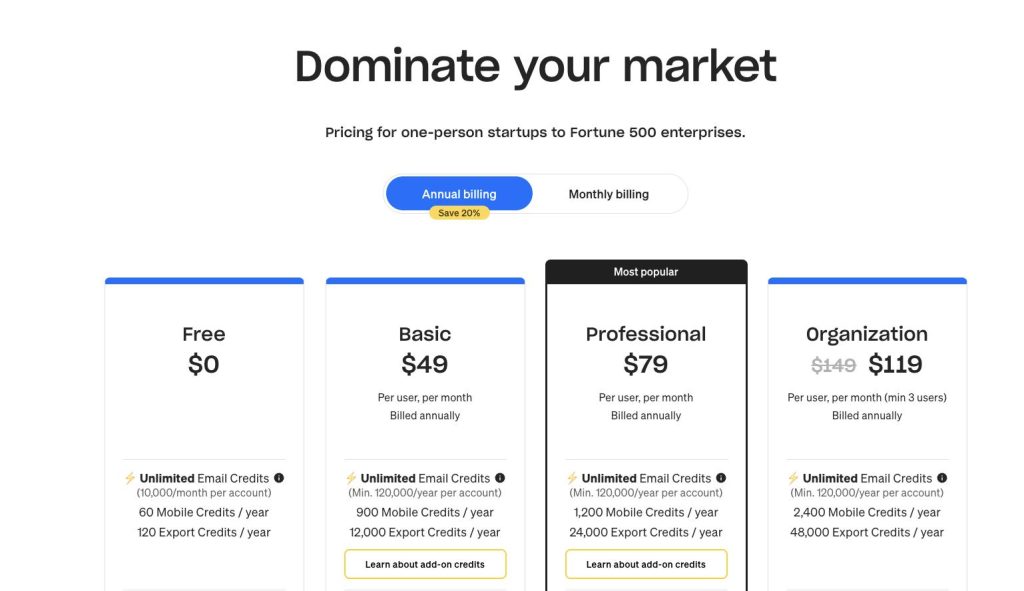6sense vs Apollo.io Quick Comparison
| Feature | 6sense | Apollo |
| Best For | Account-based marketing & AI-driven insights | Lead generation & sales prospecting |
| Database Size | 270M B2B profiles, 100M emails, 50M direct dials | 200M+ contacts |
| Starting Price | Free plan (50 credits/month), paid plans via sales | Free plan, $49/user/month (Basic) |
| AI Capabilities | Advanced predictive analytics & intent data | Basic AI support |
| Key Strength | Account-level insights & ABM focus | Built-in outreach automation |
| Free Trial | No (Free plan available) | Yes (14 days) |
Choosing the right sales intelligence platform for your business is an important part of the growth and success of your team. These prospecting tools can significantly impact your business’s ability to generate and nurture leads, and if you don’t pick the right tool for your team, you may not see the success that your business needs.
6sense and Apollo.io are two powerful platforms that cater to businesses aiming to optimize their sales strategies. We’ve spent time analyzing both tools to help you decide which one aligns best with your goals.
6sense Overview

6sense is an account-based sales and marketing platform that’s really leaning into AI. Designed to empower businesses with AI, automation, and predictive analytics, it’s taking a lot of the manual work out of prospecting so teams can focus on closing deals faster.
Popular among B2B organizations, 6sense streamlines lead-generation strategies and enhances account engagement through personalization. Use cases include demand generation, pipeline acceleration, and account-based marketing (ABM) campaigns – if you like to target key accounts, 6sense might be right for you and your team.
Apollo.io Overview

One of the most popular lead generation tools on the market is Apollo.io. With a substantial database and advanced data platform features, Apollo has a significant global presence. But just because it’s a well-known name doesn’t automatically make it the best choice for your business.
Apollo is known for its sales and marketing integrations, allowing you to seamlessly execute outbound marketing campaigns from the platform. It also provides sophisticated filtering and advanced integration and API capabilities.
Main Differences of 6sense vs Apollo
The main differences between 6sense and Apollo.io are their target use cases and core functionalities. Here’s a quick overview:
- Use Cases: 6sense focuses on predictive analytics, leveraging AI, and account-based marketing, while Apollo.io is primarily a lead generation and sales prospecting tool.
- Database: Apollo.io offers an extensive contact database at the name-by-name level, whereas 6sense emphasizes account-level insights and important metrics.
- AI Capabilities: 6sense’s AI-driven predictions set it apart, providing deeper insights into buyer intent, whereas Apollo is lagging behind in AI capabilities comparatively.
- Integrations: Both platforms offer integrations, but Apollo.io provides a more extensive set of CRM and email marketing connections.
- Ease of Use: Evaluate usability with vendor trials and demos because both platforms include advanced functionality that may require onboarding.
6sense vs. Apollo At a Glance
To help you make sense of the two tools, here’s a quick side-by-side comparison of the two across key categories.
| 6sense | Apollo | |
| Use Cases | Account-based marketing, predictive analytics | Comprehensive sales enablement, integrated marketing capabilities |
| Database Size & Reliability | 6sense Free plan access is described as 270 million B2B profiles, 100 million emails and 50 million direct dials. 6sense does not publish a platform wide accuracy percentage. | Apollo publishes that verified emails have more than 90 percent accuracy and documents a 91 percent figure for verified emails. |
| Data Enrichment Features | Advanced tools enhance contact details with insights like job titles, company size, and company insights | Advanced tools enhance contact details with insights like job titles, company size, and more |
| Lead Management | Account prioritization, intent data-driven scoring, and pipeline acceleration tools | Comprehensive tools include lead scoring, pipeline tracking, and automated workflows |
| AI Features | Workflow founded on advanced AI capabilities | AI supports predictive analytics and personalized recommendations for outreach |
| Integrations | 6sense connects with Salesforce for CRM. It also supports Marketo, HubSpot, Eloqua and Pardot through Intelligent Workflows. | Apollo integrates with Salesforce, HubSpot, Outreach, Salesloft, Marketo and SendGrid and offers API access on custom plans. |
| Ease of Use | Simpler interface with advanced features, making it great for all team sizes | Moderate complexity; powerful features may require training for effective utilization |
| Compliance | 6sense publishes security, privacy and compliance information on its Trust Center including GDPR related disclosures. | Apollo publishes privacy and compliance details in its Privacy Center and states GDPR compliance on its pricing page. |
| Browser Extension | Yes | Yes |
| Free Access? | Yes. Free plan with 50 data credits per month and access to Chrome extension and Android app. | Yes. Free Starter plan and optional 14 day trial. |
Core Features of 6sense vs Apollo
That’s a lot of info so far, so let’s take a closer look at some of the core features of both 6sense and Apollo.io. We’ll compare and contrast top features to help you better understand what’s right for your business and sales team.
6sense
6sense is a platform that’s taking advantage of AI, so if you’re interested in a platform that’s keeping with AI trends, 6sense might be right for you. Here are some of the platform’s essential features to be aware of.
- Predictive Analytics: Uses AI to identify high-value prospects at the onset, allowing you to focus on clients with a higher potential for conversion.
- Account Engagement Insights: Tracks buyer behavior across channels to prioritize outreach – by leveraging countless customer data points, 6sense can accurately predict buyer behavior and where they may be in the sales funnel.
- Account-Based Marketing Tools: Personalized campaigns based on account-level data, making it an ideal option for teams that leverage account-based marketing strategies.
- Integration Options: Connects seamlessly with CRMs like Salesforce and HubSpot.
Apollo.io
Comparatively, here’s how Apollo.io stacks up to 6sense.
- Advanced Search Filters: Pinpoint leads using detailed criteria. With over 200 points to filter on, you can get the exact list you’re looking for.
- Automated Outreach Tools: Schedule and track email sequences with built-in outbound marketing features.
- Data Enrichment: Similar to ListKit, Apollo offers fantastic data enrichment capabilities, allowing you to enhance contact details for deeper insights.
- Extensive Integrations: Similar to 6sense, Apollo lets you connect with CRMs and other sales tools.
- Free Plan: While technically not a feature, we felt it was important to call out that Apollo does have a free plan available, while 6sense does not.
Use Cases
These two platforms have different approaches to lead generation – 6sense focuses on account-based marketing tactics, while Apollo.io focuses on targeting individual contacts. Here are some use cases to better understand each approach.
6sense
Account-based marketing allows for account-level information rather than (or in addition to) individual contact details. This approach lets sales teams tackle teams or companies versus individuals within a business. With intent data, 6sense makes it easier to identify accounts or businesses that may be in a position to buy.
For example, a B2B software company may specialize in enterprise-level cybersecurity solutions. They may target accounts rather than individual decision-makers because the solutions they provide are company-wide. 6sense would help create a curated list of accounts and personalized content development for those target accounts.
Apollo.io
Apollo.io is less focused on account-based marketing and sticks to individual contacts to reach out to. The tried and true lead generation method gives you a curated, accurate list of contacts to reach out to individually. The platform also includes built-in outbound marketing tools, meaning you can leverage Apollo for more than just your contact lists – you can launch outreach campaigns from the tool.
A digital marketing agency may be able to leverage Apollo to quickly identify key contacts within small to medium businesses in their area (typically contacting CEOs, marketing managers, etc.) Apollo allows sales teams to create a highly accurate contact list and send outbound emails right from the same tool.
Database & Reliability
Both databases offer an impressive number of contacts (over 400 million in the 6sense database and over 200 million in Apollo’s). With the size of these databases, you’ll typically see similar data structures, accuracy, and availability of data, but let’s do a quick comparison.
6sense
6sense states Free plan access to 270 million B2B profiles, 100 million emails and 50 million direct dials. The company does not publish an overall database accuracy rate.
In terms of the data you receive, similar to Apollo, you’ll see name details, emails, phone numbers, and general company information.
Apollo.io
While Apollo.io’s is half the size of 6sense, over 200 million contacts is still a large enough global database to meet most businesses’ needs. Apollo states verified emails have an accuracy rate of more than 90 percent and cites a 91 percent figure in its verification documentation. However, user reviews may indicate a less accurate dataset.
Apollo has been working to continually integrate AI into their data farming and validation processes in an effort to increase data accuracy. Apollo offers standard contact details, including name, email address, phone number, and general company details.
One positive note on the data accuracy concerns – Apollo refunds the email credit if an Apollo verified email bounces within 30 days and the email was sent inside Apollo.
Pricing for 6sense vs. Apollo
While price isn’t everything when it comes to choosing a lead generation platform, it may be a deciding factor for many businesses. Let’s take a look at what each platform costs and what you’ll get with each.
6sense
6sense now publishes a pricing page that includes a Free plan with 50 data credits per month and additional paid plans with credit based tiers. Detailed plan pricing for higher tiers is still delivered via sales.
While it’s understandable the pricing may vary depending on needs and features, in a world where there is so much transparency in pricing, not publishing pricing may deter potential customers. Additionally, there is no free trial available, meaning customers have no sense of pricing or if the product is fit for purpose.
Apollo.io

Apollo is very transparent in pricing – here’s a breakdown of their various plans.
- Free Plan: Starter plan is free. Trials include 50 credits and 5 mobile credits. After trial the Free plan provides 1,200 credits per user per year granted monthly.
- Basic Plan: Basic is $49 per user per month billed annually. 30,000 credits per user per year granted upfront.
- Professional Plan: Professional is $79 per user per month billed annually. 48,000 credits per user per year granted upfront.
- Organization Plan: Organization pricing is available from sales.
Integrations & API
If you’re a sales or marketing team with lots of existing tooling, you want a lead generation platform that integrates with your existing tools. Both tools provide extensive integration and API capabilities, so let’s take a quick look at how they compare.
6sense
6sense offers key integration capabilities with major CRM platforms and open API usage. Here’s what you need to know about 6sense’s integration features.
- 6sense provides integrations with Salesforce for CRM and with Marketo, HubSpot, Eloqua and Pardot for marketing automation.
- Open API allows you to integrate with in-house systems, further enriching your data.
- Works well with other ABM platforms.
Apollo.io
Similar to 6sense, Apollo has robust integration features. Here’s what you need to know about Apollo.io’s integration and API capabilities.
- Apollo integrates with Salesforce, HubSpot, Outreach, Salesloft, Marketo and SendGrid and offers API access on custom plans.
- Seamless connectivity with email platforms such as Gmail and other email/marketing tools.
Implementation & Support
Both platforms are complex and require some dedicated support to get onboard, but Apollo’s platform may be more complex, and users typically indicate a high learning curve when joining the platform. Here’s how implementation and support stack up between both 6sense and Apollo.io.
6sense
6sense offers a dedicated account manager to help with implementation, onboarding, and ongoing support. The robust training resources are available on-demand to help team members get up to speed, and a dedicated contact makes getting support a breeze.
Apollo.io
Once implemented, Apollo’s platform can take some time to learn and master. While there is a dedicated implementation contact, ongoing support is general through self-help or via a live chat team.
Pros & Cons of 6sense vs Apollo
Every tool has pros and cons, so let’s look at 6sense and Apollo’s pros and cons to help you decide which may be right for you.
6sense
Here’s a quick breakdown of 6sense’s pros and cons.
Pros:
- Advanced AI capabilities
- Strong account-based marketing focus
- Comprehensive account insights and intent data
- Wide range of integrations and capabilities
Cons:
- No free trial available
- Lack of transparency in pricing – as you’ll see in our Reviews section, pricing is a bit of a pain point for customers
- Lack of transparency in data accuracy
Apollo.io
And here’s a quick overview of Apollo.io’s pros and cons.
Pros:
- Affordable, transparent pricing
- Free plan available (not just a trial)
- Powerful, advanced outbound marketing features are available directly in the platform
Cons:
- A complicated platform may not be as straightforward to use
- Longer implementation time
- Data accuracy may be lower than published rates
6sense vs. Apollo Reviews
We read user reviews on both G2 and Reddit to see what customers have to say about 6sense and Apollo. While Apollo seems to get higher reviews, customers rate both systems positively.
6sense Reviews
Users rated the AI capabilities, the account-based marketing focus, and the predictive, actionable insights highly. Customers appreciate the Free plan and published integrations.
Apollo Reviews
Customers highlight Apollo’s advanced features, capabilities, and built-in automation and marketing tools. Apollo cites verified email accuracy and offers a 30 day bounce refund for Apollo verified emails sent inside Apollo. The free plan featured consistently in reviews, making it a great option for customers looking to try out a new platform.
Which is Better, 6sense or Apollo?
At the end of the day, 6sense and Apollo are very different tools. While they offer some of the same features and capabilities, they were designed with two different users in mind.
Choose 6Sense For Account-Based Marketing and AI Capabilities
As we’ve mentioned through this comparison guide, 6sense was designed with account-based marketers in mind. It’s a great tool for teams focused on targeting accounts with intent data, custom outbound content, and automation. By putting AI at the forefront of the platform, teams can focus less on manual processes and more on closing deals.
Choose Apollo.io For Powerful Tools and Scalability
Apollo.io is a tool that’s focused on advanced features and scalability, meaning it can grow and adapt as teams evolve. If you’re a team looking for built-in outbound marketing features, Apollo may be the right choice for you. The platform is intuitive, cost-effective, and powerful – although a bit challenging to navigate.
Try UpLead Instead: The Best Sales Intelligence Tool for Business
If you want a tool that offers the best of both worlds, look no further than UpLead. We’ve built a platform with powerful features, industry-leading data accuracy, and a free trial that makes it easy to get started. It’s a fantastic choice for businesses looking to accelerate growth and is a suggested software for countless global users.
Start your free trial with UpLead today!
FAQs About 6sense vs. Apollo
UpLead is a better alternative to Apollo, providing the powerful tools your team needs in a simple-to-use platform.
Apollo.io is not a CRM. It is a lead generation platform. However, Apollo integrates well with popular CRM systems such as Salesforce and HubSpot.
6sense provides account-based sales and marketing tools and contact lists for B2B businesses. 6sense leverages AI to automate workflows, enrich data, and minimize manual intervention from sales and marketing teams. By spending time on closing, teams can generate more revenue.
Tools like UpLead and ZoomInfo offer similar sales intelligence capabilities, advanced tooling, and quality customer support.
Remember, while both platforms offer powerful features and robust databases, they target different teams. 6sense is better for teams focused on account-based marketing, while Apollo is better for larger enterprise teams that need scalability and growth.
If you’re looking for an affordable alternative that offers the best of both worlds, look no further than UpLead!






